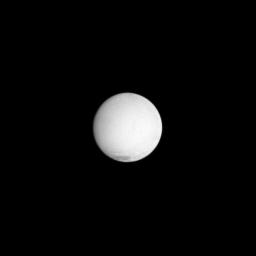
|
Young and Old
- Click the image above for a larger view
- Full-Res JPEG (648 x 648) (8.6 kB)
- Full-Res TIFF (648 x 648) (420.6 kB)
Caption:
Both ancient and more recent surfaces are exposed in this view of Saturn's moon Enceladus.
The geologically young terrain of the solar polar region can be discerned here and contrasts with the older, cratered terrain visible in the north. See PIA11685 to learn more.
Enceladus, the most reflective body in the solar system, appears particularly bright in this image taken at a low phase, or Sun-Enceladus-spacecraft, angle of 12 degrees. This view looks toward the Saturn-facing side of Enceladus (504 kilometers, or 313 miles across). North is up.
The image was taken in visible light with the Cassini spacecraft narrow-angle camera on Dec. 26, 2009. The view was obtained at a distance of approximately 472,000 kilometers (293,000 miles) from Enceladus. Image scale is 3 kilometers (2 miles) per pixel.
Background Info:
The Cassini-Huygens mission is a cooperative project of NASA, the European Space Agency and the Italian Space Agency. The Jet Propulsion Laboratory, a division of the California Institute of Technology in Pasadena, manages the mission for NASA's Science Mission Directorate, Washington, D.C. The Cassini orbiter and its two onboard cameras were designed, developed and assembled at JPL. The imaging operations center is based at the Space Science Institute in Boulder, Colo.
For more information about the Cassini-Huygens mission visit http://saturn.jpl.nasa.gov/ . The Cassini imaging team homepage is at http://ciclops.org .
Cataloging Keywords:
| Name | Value | Additional Values |
|---|---|---|
| Target | Enceladus | Saturn |
| System | Saturn | |
| Target Type | Satellite | Planet |
| Mission | Cassini-Huygens | |
| Instrument Host | Cassini Orbiter | |
| Host Type | Orbiter | |
| Instrument | Imaging Science Subsystem (ISS) | |
| Detector | Narrow Angle Camera | |
| Extra Keywords | Crater, Grayscale, Visual | |
| Acquisition Date | ||
| Release Date | 2010-03-15 | |
| Date in Caption | 2009-12-26 | |
| Image Credit | NASA/JPL/Space Science Institute | |
| Source | photojournal.jpl.nasa.gov/catalog/PIA12589 | |
| Identifier | PIA12589 | |
